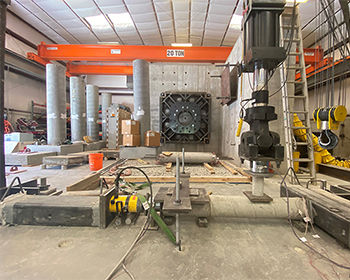MPC Region Info
Utah State University
 Faculty and students at Utah State University conduct cutting-edge research that impacts transportation issues at both the national and regional levels. The Department of Civil and Environmental Engineering at Utah State University offers an undergraduate degree in civil and environmental engineering which includes introductory courses focusing on transportation issues. Masters and PhD degrees are available for students who wish to gain a greater depth of knowledge. Students in these degree programs have opportunities to take classes in a wide range of transportation issues. Classes include: Traffic Engineering, Safety, Geometric Design of Highways, Urban and Regional Transportation Planning and Bridge Design. In addition, the Utah LTAP Center is located at USU and provides students summer internships and unique opportunities to learn more about the transportation needs within the state of Utah.
Faculty and students at Utah State University conduct cutting-edge research that impacts transportation issues at both the national and regional levels. The Department of Civil and Environmental Engineering at Utah State University offers an undergraduate degree in civil and environmental engineering which includes introductory courses focusing on transportation issues. Masters and PhD degrees are available for students who wish to gain a greater depth of knowledge. Students in these degree programs have opportunities to take classes in a wide range of transportation issues. Classes include: Traffic Engineering, Safety, Geometric Design of Highways, Urban and Regional Transportation Planning and Bridge Design. In addition, the Utah LTAP Center is located at USU and provides students summer internships and unique opportunities to learn more about the transportation needs within the state of Utah.

News Article
Research on Rebar Connections Will Lead to Better Bridges (Nov 2024)
Full Article

News Article
New Coating Protects Bridge Decks From Vehicle Fires (Nov 2024)
Full Article
University Labs / Resources
- TIMELab is used by the Utah Department of Transportation as a launching point for Intelligent Transportation Systems in Cache Valley. Lab activities help UDOT combat increasing congestion and negative safety and environmental effects of our transportation systems. It is envisioned that TIMELab will be a leader in the implementation and evaluation of rural Intelligent Transportation Systems.
- SMASH Lab (Systems, Materials, and Structural Health) is the main structural testing facility on Utah State University's campus. Research at the lab covers a wide range of topics relating to both structures and materials. Recent research projects have explored topics from lateral buckling of open-web joists to composite action of prestressed concrete sandwich wall panels.
- Electric Vehicle and Roadway Research Facility and Test Track is a glimpse into the future of advanced, electric automotive transportation. Using wireless inductive power transfer pads embedded underneath the roadway, electric vehicles can seamlessly charge while in motion. The EVR is a state-of-the-art facility at the forefront of wirelessly charge electric vehicle and roadway technologies engineering research, development and testing.
- Power Electronics Lab (UPEL) was established in 2012 as a world-class energy and power research center focusing on improving the performance of electric vehicles; enhancing battery management systems; boosting efficiency and performance of computing, lighting and power distribution systems; enabling autonomous operation of wireless sensors; integration of renewable energy sources; and development of high-performance power conversion for military and aerospace applications. Partners in the lab include the Department of energy, the Office of Naval Research, Ratheon, the Ford Motor Company, and others. UPEL is also developing an educational program for undergraduate and graduate students.
- Materials Testing Laboratory
Department Information
Dept. of Civil and Environmental Engineering
Utah State University
Engineering Lab Building - Room 211
4110 Old Main Hill
Logan, UT 84322-4110
Phone: (435)797-2932
Email: mindy.whiteley@usu.edu

